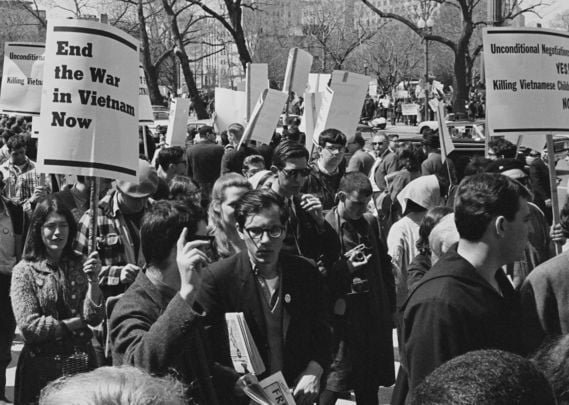Fifty-five years ago this month, in May 1968, the Vietnam War was raging. The unlikely location of a looming revolution was a Knights of Columbus Hall in Catonsville, Maryland, just west of Baltimore.
A group of activists led by two Irish American priests, brothers Philip and Daniel Berrigan walked into the second floor of the Knights of Columbus Hall, which the local military draft board used to maintain records. The Berrigans and others managed to nab hundreds of draft records.
The Catonsville Nine, as they came to be known, then carried the draft records down to a parking lot where several reporters had been told something newsworthy was about to go down. The Berrigans then set the draft records aflame.
“We destroy these draft records not only because they exploit our young men but because they represent misplaced power concentrated in the ruling class of America,” a statement read.
“We confront the Catholic Church, other Christian bodies and the synagogues of America with their silence and cowardice in the face of our country’s crimes.”
May 17 1968 – The Catonsville Nine burn Vietnam war draft records. pic.twitter.com/vjNZGM0Vrl
— DailyRadical History (@radicaldaily) May 17, 2018
As The New York Times noted in Daniel Berrigan’s obituary, in 2016, “In a year sick with images of destruction, from the Tet offensive in Vietnam to the murder of Dr. King, a scene was recorded that had been contrived to shock people to attention, and did so. When the police came, the trespassers were praying in the parking lot, led by two middle-aged men in clerical collars: the big, craggy Philip, a decorated hero of World War II, and the ascetic Daniel waiting peacefully to be led into the van.”
Berrigan’s death in 2016 marked the end of an era for Catholic activists. His brother Philip died in 2002, while another activist brother, Jerry, died last August 2015.
Still, the Berrigans were not the first and will surely not be the last to lament “power concentrated in the ruling class of America.”
It was just so jarring to see such actions and rhetoric from Catholic priests. None of which meant Daniel and Philip were immune from criticism.
They had made enemies of two of the more towering figures of mid-century American history including J. Edgar Hoover and Francis Cardinal Spellman, New York’s archbishop, who’d earned the nickname “American Pope.” Spellman and Daniel Berrigan had already clashed by 1968.
Meanwhile, the burning of the draft records in Catonsville was just the beginning of the saga for the Berrigans. Rather than simply go on trial for a variety of charges, Daniel and Philip went underground.
From time to time they would surface to make speeches, which reportedly enraged Hoover. Daniel Berrigan was finally captured in Rhode Island in August of 1970. Even after he’d served several years in prison, he continued to provoke in the name of pacifism and a more just world.
The Berrigan brothers were unique symbols of a social justice strain of Catholicism that is too little acknowledged by devout as well as secular observers.

Love Irish history? Share your favorite stories with other history buffs in the IrishCentral History Facebook group.
What kind of family would produce such a string of principled troublemakers?.. An Irish one, to begin with.
Daniel Berrigan wrote at length about his father, Thomas William Berrigan, who himself was a union activist as well as a farmer and railroad worker. Daniel was born in Minnesota but the family, which would ultimately contain six sons, moved to Syracuse, New York when the children were young.
“And my father. One had best begin here, a fretful topic, and to the present day by no means satisfactory,” Berrigan wrote in his autobiography "To Dwell in Peace".
“He compounded in one life the ironies and contradictions said to compose the Irish character.”
It was a volatile home, with the Berrigan parents often doing battle.
“I remember, as my eyes opened to the lives of neighbors, my astonishment at seeing that wives and husbands were not natural enemies,” Daniel writes.
That’s one explanation, perhaps, for a life of pacifism.
Though best known as a rabble-rousing activist, Berrigan was also an acclaimed poet and author and is even believed to be the inspiration for the radical priest in Colum McCann’s brilliant novel "Let the Great World Spin".
* Originally published in 2016, updated in May 2023.




Comments